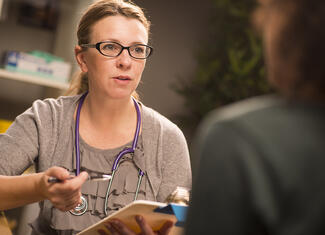
There is a wide range of sexually transmitted infections (STIs) that sexually active Vermonters may be exposed to or infected with. These germs may be viruses (HIV, HPV), bacteria (chlamydia, gonorrhea, syphilis) or parasites (pubic lice or crabs, trichomonaisis). Many STIs are treatable or can be cured, but the medications and protocols differ from germ to germ. The populations who are most affected by individual STIs are varied. Like STI treatments, STI testing guidance is not universal across all germs or for all risk populations.
We can help health care providers navigate these variables. The Health Department promotes testing and treatment guidance from the Centers for Disease Control and Prevention (CDC). We help ensure that Vermont medical providers have access to the latest information and implement best practices for their patients. CDC supports Expedited Partner Therapy for treatment of STIs. Expedited Partner Therapy for chlamydia and gonorrhea is legally permitted in Vermont and is something we strongly encourage providers to deliver.
In some cases, the Health Department can provide specific medications to clinicians to treat syphilis, gonorrhea and chlamydia infections in their patients. Medical providers can contact us in order to provide support services to Vermonters who are newly diagnosed with bacterial STI infections. We can help patients better understand what their STI diagnosis and treatment means for them. On a free and voluntary basis, the Health Department can assist people diagnosed with bacterial STIs to notify their sexual partners and link these partners to testing or treatment.
For more information:
- The Vermont Department of Health Laboratory performs clinical testing in the following areas: Bacteriology, Mycology and Mycobacteriology, Virology, Parasitology, Serology, Molecular Subtyping, Urine Drug Testing and Blood Lead Testing
- Information on Vermont Expedited Partner Therapy standards
- Patients can access free condoms at many Health Department offices in Vermont
- STI testing and treatment guidance for medical providers (CDC)
- STIs (CDC)
